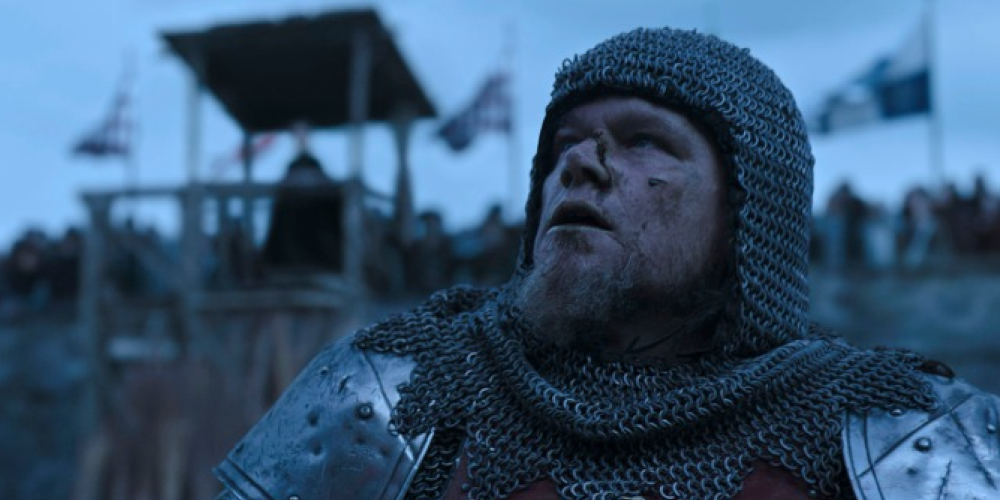In The Last Duel, Ridley Scott returns to his cinematic first love.
The idea of two rivals in a duel to the death is an innately romantic one, but where Scott’s directorial debut was devoted to it, in his latest it’s both beginning and ending.
Paris, 1386. Nobles and peasants alike have turned out for a rare spectacle. Sir Jean de Carrouges (Matt Damon, brutish with only shades of sympathy)1 and Jacques Le Gris (Adam Driver, threading the needle between roguish and noble)2 are to battle to the death before the assembled crowd. The cause: that Carrouge’s wife, Marguerite (Jodie Comer – understated, intelligent, prepossessing), has accused Le Gris of raping her.
The Last Duel‘s narrative, written by Nicole Holofcener, Damon, and Ben Affleck,3 presents this in the style of Rashomon, as three alternate, coinciding flashbacks. The first two, those of Carrouges and Le Gris, retell many of the same events, but with key differences.
Case in point: their service in the Caroline War. In Carrouges’ telling, he’s courageous, defying orders for the sake of innocent lives. In Le Gris’, Carrouges is reckless and personally responsible for a defeat.
In all cases, Damon is stolid, a warrior who boasts of scars obtained in the service of the King (Alex Lawther – amused, distracted)4 yet marries the daughter of a traitor.5
His fellow squire, Le Gris, is a libertine, though not without loyalty, whose bookmaking and tenant-wrangling skills endear him to his liege lord, Count Pierre d’Alençon (a scene-stealing, bleach-blonde, self-amused Ben Affleck). This puts Le Gris at odds with Carrouges, who, though Le Gris considers him a friend, is held out of favour.
Marguerite is the dutiful, quietly brilliant wife whose own story is presented unambiguously as ‘The Truth’. The rape is shown from multiple perspectives, but, despite Le Gris’ delusions of chivalrous conquest, it is never anything but that: a rape.
Scott is a master of historical epic6 and The Last Duel shows him at full command of his powers.
With longtime collaborator Dariusz Wolski as DoP, the film captures the mud, murk, and brutality of the feudal battlefield with perfect clarity.7 Composer Harry Gregson-Williams blends lively strings with haunting choral elements, and a few anachronistic touches, like the taiko drums on Jacque Le Gris’ theme; creating a score that is atmospheric but never overwhelming.
The soundtrack falls away all together during the titular last combat, leaving us with the clash and clang of Michael Fentum’s sound design and Wolski roving camera plunges us into the melee.
However, the film is not all sound and fury. The balance between the personal and historical is well-judged, as are the social implications. That Marguerite’s rape is seen not as a crime against her, but as a violation of her husband’s property,8 is decidedly Medieval. That her having once agreed that Le Gris is handsome is given in testimony against her feels uncomfortably modern. The platform from which Marguerite views the duel has kindling stacked below it. Should her husband fall “defending her honor”9, her vantage point will be her pyre.
At 153 minutes, The Last Duel could be a slog. Still, even given the heavy subject matter and its varied depictions of violence, the film gives a compelling perspective on pride and impulses of men and those who suffer them.
With House of Gucci due for release next month, Ridley Scott, now 83, is a filmmaker who shows no sign of running out of things to say. Though, given it’s abysmal performance at the box office, The Last Duel may well be his last cry at a historical epic.
- Up to a point.
- Again, up to a very crucial point.
- Their first script together since Good Will Hunting.
- And paired with a queen (Serena Kennedy) who looks distractingly like his sister. Wikipedia informs me that Charles VI and Isabeau of Bavaria weren’t related, then again they were European royalty, which tends towards interlacing family trees.
- Played by Nathaniel Parker, who I best know for essaying the role of Henry VIII in the stage adaptation of Hillary Mantel’s Wolf Hall trilogy.
- Most of the cast adopt the generic (Received Pronunciation) English accent that seems to be the default in such films. Better that a Monty Python attempt at a French.
- This marks the first time I’ve ever seen chainmail repurposed as a knuckleduster.
- Which she manages in his absence, and more ably.
- His pride.
